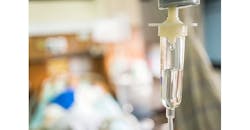Facing Saline Shortage, FDA Prioritizes Some Puerto Rico Plants
U.S. drug regulators say they’ll move some “critical facilities” that make saline bags to the front of the line for access to Puerto Rico’s still-fragile electrical grid, in an attempt to alleviate a U.S. shortage of the critical medical supply.
Puerto Rico is a major hub of drug manufacturing and one of the key manufacturing sites for saline bags that are ubiquitous in hospitals and medical clinics. The island’s electrical grid was badly damaged by Hurricane Maria, and most Puerto Ricans still lack power two months after the storm.
Baxter International Inc. is the biggest U.S. supplier of small saline bags, and the company’s Puerto Rico plants lost power in the storm. The Food and Drug Administration, which is monitoring the supply of dozens of drugs made in Puerto Rico, said Baxter’s facilities will get priority access to the grid in order to try and keep supplies flowing.
As of Monday, Baxter said that all but one plant in Puerto Rico now had grid power. But the FDA, in a statement, said that even factories back on the grid face interruptions in power.
“The situation in Puerto Rico has greatly exacerbated this supply issue,” FDA Commissioner Scott Gottlieb said in the statement. “The FDA is actively working to address the shortage.”
Small saline-solution bags cost about $1.50 each and are the preferred method for delivering everything from painkillers and antibiotics to chemotherapy and heart drugs. Supplies were already problematic before the hurricanes hit Puerto Rico, but the storms caused shortages that prompted the American Hospital Association to write to Congress to say that the U.S. health-care system was on “the brink of a significant public health crisis.”
The FDA said authorities have been “very responsive” to requests for access to the grid. In the meantime, regulators have also authorized temporary imports of saline and the agency has approved some new IV solution products.
By Cynthia Koons and Robert Langreth
About the Author
Bloomberg
Licensed content from Bloomberg, copyright 2016.
